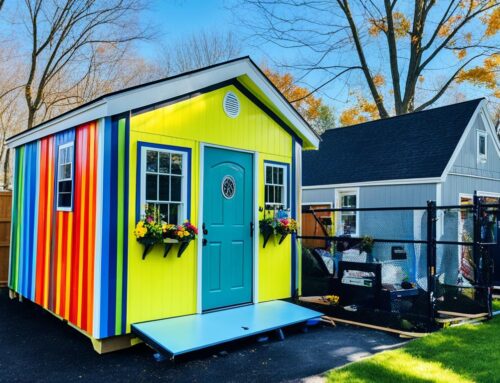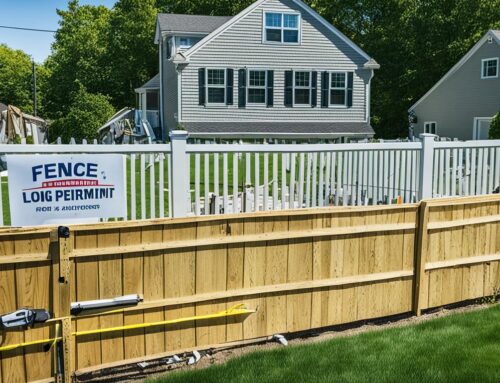Melton Truck Lines has been on the road for over 70 years. It boasts 1,400 trucks and more than 5,000 happy shippers in the U.S., Canada, and Mexico. This big operation is like getting a driveway permit in Long Island. If you’re aiming to build a pool, deck, shed, or fence, knowing the permit approval process and NY regulations is key.
Traci’s Permits can lead the way. They offer knowledge and support through the local rules. Their help ensures your project moves smoothly from the start to the final check.
Key Takeaways:
- Smoothly navigate the permit approval process with Traci’s Permits.
- Avoid pitfalls and delays by understanding NY regulations.
- Save time and resources with expert help from application to inspection.
- Ensure compliance with local codes for Long Island home renovations.
- Traci’s Permits offers invaluable help in securing a driveway permit in Long Island efficiently.
Understanding Driveway Permits in Long Island
Driveway permits in Long Island are essential. They are approvals from local authorities. They ensure projects meet safety, design, and access standards. It’s crucial to get one for new driveways or when widening an existing one. This helps integrate projects with public paths.
What is a Driveway Permit?
A driveway permit is a must for homeowners wanting to build or change their driveway entrances. It makes sure you meet local codes. This keeps public areas safe and accessible for everyone.
Why You Need a Driveway Permit
In NY, getting this permit is required to avoid breaking laws. It helps your driveway fit well with public roads and pavements. It also lowers the chance of accidents with cars, bikes, and people.
Types of Driveway Permits
Long Island towns have different rules for driveway permits. For instance, North Hempstead needs permits for new or modified driveways. However, Oyster Bay has rules for patio heights. Checking with local departments tells you if you need a permit.
The list below shows some permit details for various towns:
| Town | Permit Requirement | Notes |
|---|---|---|
| Oyster Bay | No permit required for patios up to 4″ above grade | Patio size max 250 sq. ft. |
| North Hempstead | Permit required for new construction and modifications | Check with building department |
| Huntington | Changes in codes can affect permit requirements | Contact building department for latest updates |
Steps to Obtain a Driveway Permit Long Island
Getting a driveway permit in Long Island requires knowing some key steps. We’ve laid out the important phases below. Our guide is for both homeowners and contractors from start to end.
Preparing Your Application
First, collect all the needed documents. Homeowners should have a site plan of the driveway, ownership proof, and maybe a contractor’s sketch. Before you submit, there’s a review to check your documents. The PERM 33-COM Application and Checklist is useful for commercial permits.

Submitting Your Application
Next, you hand in your application to the local authorities, likely the Long Island highway department. Bring your documents and pay the fees. You might need different forms like PERM 33 or PERM 36. Some projects may need a traffic study or drainage analysis, especially if they affect a state highway.
Inspection and Approval Process
After applying, your project gets inspected for meeting local laws. This step is key to getting your permit. Following the Standard Details and Specifications helps avoid delays. When everything is right, you get the final OK. Then, you can start on your driveway project.
By following these steps – prepare, submit, and pass inspection – you can get through the permit process smoothly. This ensures your project meets all rules and moves forward without issues.
Common Requirements and Regulations
Homeowners on Long Island need a permit for their driveway. They must follow local town codes. These codes cover driveway width, access for emergency vehicles, and how to make driveway aprons and curb cuts. Each town, like Hempstead or Babylon, has its own rules. These rules help keep the area safe and consistent.
Minimum Standards for Driveway Width
There’s a required minimum width for driveways to be safe and functional. Single-car driveways need to be at least 10 feet wide. Double-car driveways should be 18 feet wide. This width lets cars pass safely and allows emergency services to get through.
Guidelines for Driveway Aprons and Curb Cuts
Driveway aprons and curb cuts connect the drive to the street. They must be built following town guidelines. The right materials and a slope that stops water from running onto the street are important. Curb cuts need to be placed carefully. This is to keep car access smooth and prevent damage to sidewalks and roads.
Understanding Town Code and Regulations
Following Long Island’s rules means knowing your area’s town code. In Islip, for example, you need various permits for driveway work. These include permits for building changes and installing certain systems. You might also need a permit for adding things like cell towers.
Finding out and sticking to these local rules isn’t just about following the law. It helps keep Long Island looking good and staying safe. It’s about being part of a community that takes pride in its appearance and organization.
| Action | Permit Type | Regulating Department |
|---|---|---|
| Building alterations | Building permit | Department of Public Works |
| Installing HVAC systems | Plumbing/HVAC permit | Fire Prevention Systems Department |
| Adding curb cuts | Engineering site plan approval | Planning Division |
| Construction near wetlands | Site-specific permit | Environment Department |
Costs Associated with Driveway Permits
Getting a driveway permit on Long Island comes with different costs. It’s key for homeowners to know these costs for good budgeting. This helps avoid surprises during the process.

Application Fees
The fee to apply for a driveway permit varies. It depends on your location in Nassau or Suffolk Counties and your project’s type. Some examples include:
- Building Permit Review – 239F (Initial Review): $1500.00
- Road Opening Permit Application – Residential: $275.00
- Road Opening Permit Application – Commercial: $550.00
- Subdivision Plan Review (Initial review): $7,000.00 + $300.00 per lot
- Sewer Permit: $120.00
Inspection Costs
The permit process in Long Island often requires an inspection fee. This is to check that driveway work meets local rules. Additional fees may apply for professional assessments.
Potential Additional Expenses
You should also think about other possible costs. For example, you might need an engineer or have to adjust your plans to follow rules. Or, unexpected things could come up. Here are some specific examples:
- Residential or noncommercial curb cut permit application fee: $55 for single-car width, $75 for double-car width
- Commercial curb cut permit application fee: $300
- Flow rate costs for different places, like a Hospital Flow Rate: 300 gallons per day per bed
- Changes needed to meet specific town rules, like apron height in the Town of Hempstead
Knowing about these parts of the Long Island permit process means homeowners can be ready for the permit fee and any other costs that come up.
Top Tips for Quick Permit Approval
To get a quick permit approval in Nassau County, you need to plan well. Use these tips to avoid delays and make the process smoother:
- Prepare Thoroughly: Make sure you have all documents, like site plans, ready and correct. Missing information can cause delays.
- Engage Professionals: Working with experts like Tracis Permits helps a lot. They know the rules in Long Island very well.
- Understand Right-of-Way: Know your property’s boundaries and Hempstead’s rules. This prevents mistakes when applying.
- Communicate Proactively: Always talk clearly and quickly with the authorities if they have questions or concerns.
Driveway projects have important cost factors. It costs $2 to $15 for every square foot to widen a driveway. The material affects the price. If you need a professional for 200 more square feet, it could cost from $400 to $3,000.
Don’t forget, breaking permit rules can lead to at least $350 in fines. It’s vital to follow all local zoning laws.
| Forum | Posts | Times Read | Reputation |
|---|---|---|---|
| Nassau County | 146 | 279,755 | 50 |
| Nassau County | 186 | 526,247 | 139 |
| Nassau County | 238 | 1,957,480 | 142 |
By using these tips, you can avoid delays and get your driveway permit faster. This ensures you follow the rules and finish your project without problems.
Conclusion
Getting a secure driveway permit in Long Island is key in your renovation plans. Knowing the local laws and being detailed in the permit process helps get quick approval. This makes sure your renovations follow the rules and go smoothly.
When you prepare your documents, think about the costs and rules involved. Below are some costs you might face in the permit process:
| Service | Cost |
|---|---|
| Building Permit Review – 239F (Initial Review) | $1500.00 |
| Dye Test (Lowest possible) | $160.00 |
| Road Opening Permit Application – Residential | $275.00 |
| Scavenger Waste (Bay Park only) (per 1,000 gallons) | $53.00 |
| Special Permits (Commercial) (Lowest possible) | $160.00 |
| Subdivision Plan Review (Initial review) | $7,000.00 |
| Design Sewage Flow Rate for Single Family Residence | 300 Gals. Per Day (gpd) |
| Design Sewage Flow Rate for Bowling Alley/Tennis Court | 100 gpd/court or lane |
| Design Sewage Flow Rate for Restaurant | 30 gpd/seat |
| Application fee for residential or noncommercial curb cut permit | $55 for single-car-width driveway (10 foot maximum), $75 for double-car-width driveway (18 foot maximum) |
| Application fee for commercial curb cut permit | $300 |
It’s smart to get professional help to go through these complex steps easier. This ensures you handle every part of getting a secure driveway permit correctly. Doing so helps your project move forward fast and legally. In the end, knowing and following these rules leads to a successful Long Island renovation.
Contact Information
If you live on Long Island and need help with driveway permits or other home renovation approvals, Tracis Permits can help. They know the local codes well and make getting permits easy and stress-free. They’re good at what they do, from filling out applications to final inspections.
For a project that meets all rules and to avoid problems, call Tracis Permits at 631-492-0927 for a free talk. They offer a wide range of services for anyone in Long Island needing a permit professional. Their team helps with new builds or updates to make sure you get your permits fast.
Getting permits smoothly is easier with Tracis Permits. They help you understand forms like the Residential Application Checklist (Form WWM-202) and deal with the Suffolk County Sanitary Code Article 6. They make sure all your documents are right. For help with drainage or wastewater, Tracis Permits is a dependable choice.












